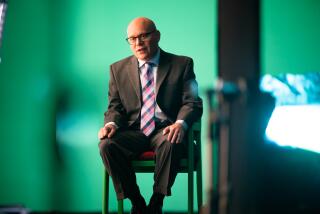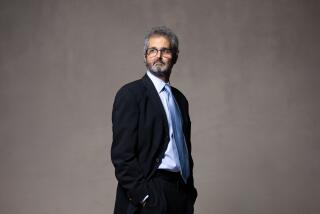Review: ‘Prosecuting Evil: The Extraordinary World of Ben Ferencz’ salutes a human rights giant
- Share via
The rule of law. Crimes against humanity. Bringing justice to an unjust world. Worthy topics all, but would you actually want to see a film about them? If the work in question is “Prosecuting Evil: The Extraordinary World of Ben Ferencz,” the answer is an unequivocal yes.
That’s because Ferencz, the last surviving lead prosecutor at World War II’s Nuremberg Trials and still very much active at age 98, has an exceptionally engaging presence to go along with his unexpectedly compelling life story.
Self-aware, funny and articulate, blessed with a first-class temperament, Ferencz is front and center telling his own tale, which includes being the key player in what’s been called the biggest murder trial in history.
Yes, there are talking heads like Gen. Wesley Clark and attorney Alan Dershowitz to fill in the details for director Barry Avrich, but they are window dressing to the main event.
For more than being a great raconteur, the dapper Ferencz benefits from a career trajectory that is as much the result of happenstance as careful planning.
Though he proved supremely suited to it, being the leading figure for decades in the fight for an international criminal court was not exactly a career Ferencz mapped out for himself.
In fact, the son of Jewish immigrants from Hungary who traveled to the U.S. third class “because there was no fourth class,” Ferencz not only didn’t have college on his mind, he’d never so much as met anyone who’d gone there.
A stint at New York’s City College led to a scholarship at Harvard Law, where he made a chance connection to a professor who was an authority on war crimes.
World War II changed Ferencz’s life, but not in the ways he anticipated. His small stature (around 5 feet) held him back from enlisting, and after a variety of postings he was sent to concentration camps like Buchenwald as they were liberated to gather evidence for future trials.
The experienced changed his life.
Even today, decades after the fact, Ferencz breaks down when he describes what he saw: “The stench, humans crawling like rats. … It’s incomprehensible to the rational human mind.”
“He was traumatized by what he saw at the camps,” says his son Don. “It fueled a nuclear reactor inside this man.” So much so that the son remembers being asked “every night at dinner, and I mean every night, ‘What have you done for mankind today?’”
That experience plus his law degree led to working on one of the 12 postwar Nuremberg trials that focused on the members of the Einsatzgruppen, SS units that specialized in the mass execution of Jews and victims of the Nazi regime.
Because the 22 people he brought to trial had been responsible for the deaths of more than a million victims, his trial was called the biggest murder trial of all time.
Ferencz only went after the biggest fish, the highest ranking and most educated members of the Einsatzgruppen, and though he says with pride “I got the bastards,” the lesson he learned continues to haunt him.
“War will make mass murderers out of otherwise decent people,” he says more than once. “I have seen it again and again and again. That’s the effect of war.”
When Ferencz returned to private practice after the war, he found that big firms were reluctant to hire him: “They said, ‘If we have to hang Nazis, we’ll call you.’”
So he began practicing what fellow attorney Dershowitz calls “human rights law when there was no such thing.” That led him to a decades-long campaign for an international criminal court, reasoning “it was common sense: if there were international crimes individuals must be held responsible.”
Some of the most engaging stories in the film come from lawyer/diplomat David Scheffer, who relates walking from New York’s Penn Station to the U.N. during a blizzard to get on the record the U.S.’ last-minute signature on the treaty to finally establish such a court.
Though the court was established in the Hague in 2002, the U.S. Senate has yet to ratify the treaty, but Ferencz has neither given up hope nor stopped believing that such an institution is essential.
“It’s time to stop before we kill everybody, and we’re on that path now,” he says with conviction. “Law is better than war.”
------------
‘Prosecuting Evil: The Extraordinary World of Ben Ferencz’
Not rated
Running time: 1 hour, 23 minutes
Playing: Laemmle’s Music Hall, Beverly Hills
More to Read
Only good movies
Get the Indie Focus newsletter, Mark Olsen's weekly guide to the world of cinema.
You may occasionally receive promotional content from the Los Angeles Times.











